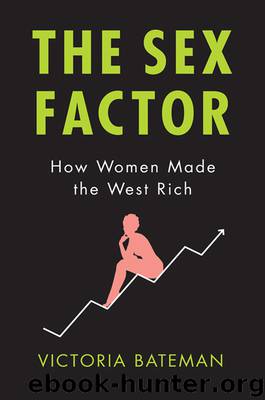The Sex Factor by Victoria Bateman

Author:Victoria Bateman
Language: eng
Format: epub
Publisher: Wiley
Published: 2019-05-26T16:00:00+00:00
Following in the footsteps of Friedrich Hayek, Milton Friedman's Capitalism and Freedom captured the wave.22 Friedman argued that political and economic freedom are inextricably linked; that ‘a society which is socialist cannot also be democratic, in the sense of guaranteeing individual freedom.’ He was well aware of the fact that society was not always harmonious and that there was therefore the risk of an inherent conflict between society and the individual. Friedman argued that the market could ease the resultant tension, allowing us to engage in an anonymous fashion without having to agree with one another. The result was that we could all live side by side and meet our daily needs in a way that avoided enforced conformity. To quote Voltaire: ‘Go into the London Stock Exchange … and you will see representatives from all nations gathered … Here Jew, Mohammedan and Christian deal with each other as though they were all of the same faith.’23
Not only do markets allow us to try to escape the norms of society, enabling us to be ourselves, market competition adds a further release valve: it means that individuals have at least some chance of escaping individual cases of abuse. The market might be brutal but so can the state be too. And whilst in human nature ‘bad apples’ are inevitable, they are, in general, more likely to face the consequences of their actions in the marketplace than they are in any state-run economy. Without competition to expose them, the state can cover up wrongdoing, meaning that abuses continue. Indeed, it has an incentive to do so in order to hold on to its reputation for ‘social good’. In the marketplace, even though cover-ups can and do happen, competition pushes in the direction of rooting out wrongdoers. Either consumers get wind of it and stop buying a particular producer's goods, or workers move on to another producer. Although the mechanism for this to happen is not perfect ‒ consumers do not always find out the full facts and workers facing abuse are not always mobile ‒ at least it provides a possibility of punishment and escape that is missing when the state has a monopoly of power ‒ and, all importantly, a monopoly of force, which enables it to imprison or even kill those who speak out.24
Exploitation and violence levelled at women is regularly blamed on capitalism but society is, more often than not, the underlying cause. That includes Federici's classic example: the tens of thousands of women burnt at the stake in Europe during a 200-year period of witch trials in the course of the sixteenth and seventeenth centuries. Witch burnings reflected the way in which society felt threatened by increasingly independent single women. And, as new research shows, they were also a response to increased competition between different Christian religious sects as a means to demonstrate their purity value to the masses.25 In the modern world, witch burnings and other forms of violence towards women ‒ including FGM ‒ are similarly the result of bad social practices.
Download
This site does not store any files on its server. We only index and link to content provided by other sites. Please contact the content providers to delete copyright contents if any and email us, we'll remove relevant links or contents immediately.
The Secret History by Donna Tartt(16623)
The Social Justice Warrior Handbook by Lisa De Pasquale(11489)
Thirteen Reasons Why by Jay Asher(7788)
This Is How You Lose Her by Junot Diaz(5771)
Weapons of Math Destruction by Cathy O'Neil(5036)
Zero to One by Peter Thiel(4824)
The Myth of the Strong Leader by Archie Brown(4789)
Promise Me, Dad by Joe Biden(4447)
Beartown by Fredrik Backman(4417)
Stone's Rules by Roger Stone(4415)
How Democracies Die by Steven Levitsky & Daniel Ziblatt(4398)
The Fire Next Time by James Baldwin(4342)
100 Deadly Skills by Clint Emerson(4076)
A Higher Loyalty: Truth, Lies, and Leadership by James Comey(4032)
Rise and Kill First by Ronen Bergman(4012)
The David Icke Guide to the Global Conspiracy (and how to end it) by David Icke(3881)
The Farm by Tom Rob Smith(3872)
Secrecy World by Jake Bernstein(3782)
The Doomsday Machine by Daniel Ellsberg(3730)
